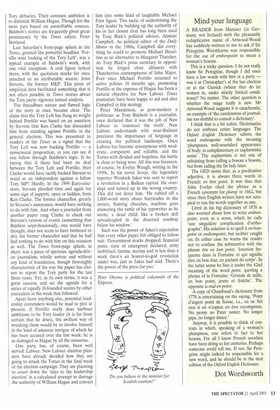Mind your language
A READER from Munster (in Germany, not Ireland) with the pleasantly reduplicative name of Attwood-Wood has suddenly written to me to ask if Sir Peregrine Worsthome was responsible for the use of embonpoint to mean a woman's bosom.
This is a tricky question. I do not really know Sir Peregrine, though I did once have a few words with him at a party — was it at Christopher's at the last election or at the Garrick (where they do let women in, under strictly limited conditions)? No matter. The other question is whether the usage really is new. Mr Attwood-Wood suggests it is catachrestic, an example of 'the carelessness of journalists too slothful to consult a dictionary'.
I think that is a bit unfair. Dictionaries do not embrace entire languages. The Oxford English Dictionary admits the word embonpoint with the meaning 'plumpness, well-nourished appearance of body; in complimentary or euphemistic sense'. The euphemism is not one of refraining from calling a bosom a bosom, but from calling the fat lady fatso.
The OED notes that, as a predicative adjective, it is always three words in French: en bon point. It was thus that John Evelyn cited the phrase as a French synonym for plump in 1662, but since then English writers have not scrupled to run the words together as one.
Littre in his big dictionary of 1876 is also worried about how to write embonpoint, even as a noun, which he calls 'tine singuliere complication d'orthographe'. His solution is to spell it en-bonpoint or embompoint, but neither caught on. In either case he warns the reader not to confuse the substantive with the phrase etre en bon point, 'locution frequente dans la Fontaine et qui signifie etre en bon etat, en parlant du corps'. In the latter sense he lists it under the 42nd meaning of the word point, quoting a phrase of la Fontaine: 'Grande de taille, en bon point, jeune et fraiche'. The opposite is mal-en-point.
A copy of Chambaud's dictionary from 1778 is entertaining on the saying, 'Point d'argent point de Suisse, i.e., on ne fait rien si on n'espere en etre recompense. No penny no Pater foster. No longer pipe, no longer dance.'
Anyway, it is possible to think of contexts in which, speaking of a woman's plumpness, one refers in fact to her bosom. For all I know French novelists have been doing so for centuries. Perhaps someone could tell me. If not, Sir Peregrine might indeed be responsible for a new word, and he should be in the next edition of the Word English Dictionary.
Dot Wordsworth


































































 Previous page
Previous page